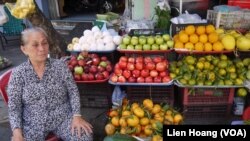Can the planet feed itself in the future as the number of humans multiplies? Food security sounds like a fair enough goal. But not, some say, if it involves the company Monsanto.
The agriculture and chemical giant co-sponsored a workshop in Ho Chi Minh City last month to get young people interested in sustainable farming. But critics are suspicious of Monsanto’s motives, especially in Vietnam, because the company produced Agent Orange, a defoliant used in the Vietnam War and believed to be the cause of health problems for millions.
According to Monsanto’s web site, it was “one of nine wartime government contractors who manufactured Agent Orange” between 1965 and 1969
Chuck Palazzo, a founding member of the Vietnam chapter of Veterans for Peace, accused Monsanto of trying to “brainwash” locals, especially young people. The company is on a public relations push to align itself with the positives of food security, he said, instead of its controversial products, Agent Orange and genetically modified seeds.
Even if Monsanto has pure intentions, it should wait to get involved in sustainable agriculture and first compensate Vietnamese who suffer birth defects like missing limbs and distended bodies, Palazzo said.
“The first thing they need to do is benefit, somehow, the victims of Agent Orange, they need to show some good faith,” he said. “Doing the right thing, in my mind, is giving financial benefits, medical benefits, and social benefits.”
Monsanto said it would not be available for comment by the time this article is scheduled for publication. But the company wrote in a blog post about last month’s workshop that it aims to help Vietnamese farmers get more out of their fields. Land is finite, but if growers use technology to expend less water, choose productive crops, plant better seeds, and grow on quality soil to improve yields, Vietnam can become “a powerful country in agriculture,” the post said.
“Vietnam will be a main market for the company in the upcoming years and there will be more investment in the country in the future,” Monsanto vice president Juan Ferreira said at the workshop. “In Vietnam, we see very large potential.”
One academic in a town known for growing coffee and fruits said she was encouraged to hear about the company’s foray into sustainable farming. Cao Thuy-Anh, a lecturer at the University of Dalat’s Faculty of Environment and Natural Resources, worries that Vietnamese are less interested in farm work these days.
Vietnam is among the world’s biggest exporters of coffee, rice, and cashews, and it depends on agriculture, forestry, and fishery products for 18 percent of its economy. Thuy-Anh hopes Monsanto can revive the industry and help graduates find jobs.
“In Vietnam, the young generation, they don't want to get involved in the agriculture sector because they say it's very hard work,” she said. “Their parents work in the farm, but they said to me, after the graduation, they want to find the jobs in the city.”
Thuy-Anh hadn’t heard of Monsanto before this week. Among Vietnamese who don’t know the source of Agent Orange, it would be easier for Monsanto to reinvent itself.
The company’s work to get farmers to use their land more efficiently, and thus feed millions of people, could improve its reputation, especially in Vietnam. But Palazzo sees this as just another way for Monsanto to sell seeds and make money. And he can’t divorce these different sides of the company -- its role in food security today, versus its role as purveyor of a wartime herbicide. Palazzo also opposes genetically modified seeds, which some fear could render long-term health problems.
“In my mind it’s just about impossible to compartmentalize each of those and say, this is the good Monsanto and this is the bad Monsanto,” he said.
Thuy-Anh is more optimistic.
Americans often come to Vietnam expecting to meet bitter locals who blame them for abandoning the country and the war in 1975. But Vietnamese like Thuy-Anh have moved on. She said she doesn’t resent Monsanto for selling Agent Orange to the U.S. military.
“Personally, I don’t think it matters because you know, everybody, every company has their past,” she said. “Now we look at the present and the future.”




